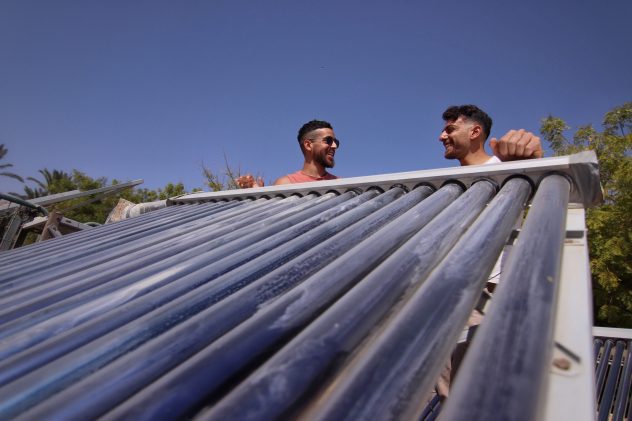
The Center for Renewable Energy and Energy Conservation’s Social Innovation Lab is a dynamic hub where creativity and collaboration drive the energy transition in the Middle East to tackle climate change and environmental justice. The Lab’s primary objectives are to accelerate the use of renewable energy sources while ensuring access to electricity, democratize the energy system, and increase public participation in the energy transition. It prioritizes the development of innovative and sustainable solutions to address the challenges of our times.
Understanding the Social Innovation Lab: The social innovation lab is a powerful and collaborative platform to solve complex social challenges and generate innovative solutions for energy transition. It brings together various stakeholders, including government agencies, non-profit organizations, businesses, and community members, who collaborate to explore and experiment with different approaches. This lab prioritizes creativity, co-creation, and a user-centered design process, utilizing their potential to develop practical solutions that drive positive social change.
Addressing the Middle East’s Environmental Challenges in the Context of Energy Transition: In the Middle East, there is a pressing need to increase climate change awareness, and craft effective policies for environmental challenges within the context of energy transition. The involvement of citizens in the shift towards renewable energy sources is essential in achieving this goal. The involvement of communities is critical in driving practical climate actions and promoting sustainable practices in Middle East. Through active participation, society can significantly contribute to the fight against climate change, and pursue a more sustainable future.
Dual Commitment to Energy Transition in the Middle East: The Social Innovation Lab is dedicated to two overarching goals in the context of energy transition in the Middle East. First, it strives to accelerate the adoption of clean and sustainable energy sources within the energy transition framework. Second, it aims to empower communities with dependable and affordable electricity as part of its commitment to energy transition. Our team firmly believes in the potential of renewable energy to combat climate change while simultaneously bridging energy disparities in marginal communities through renewable energy technologies.
Ongoing projects
Both Israel and the United Kingdom have ambitious climate targets. The UK is home to a dynamic community energy sector while in Israel only a limited number of communities engage with energy issues at present. Despite varying material, social, and historical circumstances, both countries face a similar challenge: how to foster community participation in energy system decarbonization and deliver community-based climate resilience.
This project will establish a new group of researchers, practitioners, and policymakers working towards climate-resilient communities who are actively engaged in energy system decarbonization. The aim of the project is to foster practical knowledge through the exchange of researcher and practitioner experience, on how citizens can participate in the energy transition through citizen-led community energy initiatives.
Empowering Bedouin communities: Harnessing community energy for climate resilience
The project is supported by The Wohl Clean Growth Alliance Grants, British Council Israel.
Community microgrids are essential to the energy transition, offering a comprehensive and community-focused approach to renewable energy production. In addition to improving energy resiliency and empowering nearby people, these microgrids also significantly reduce carbon emissions. Community microgrids play a bigger and more significant role in shaping the energy landscape as efforts to create a more resilient and sustainable future continue.
Public participation is the key to a successful renewable energy transition. Involving citizens in the decision-making processes surrounding energy policies and projects is essential for creating a sustainable and inclusive future. Through, for example, citizens’ assemblies, online platforms, and collaborative initiatives, individuals become active stakeholders, shaping the direction of our energy landscape. Public participation fosters a sense of ownership and shared responsibility in transitioning to cleaner and more sustainable energy sources by ensuring diverse voices are heard. This engagement not only enhances the quality of decision-making but also builds trust and strengthens the social fabric, paving the way for a resilient energy future that reflects the needs and aspirations of communities.
Publications
Photovoltaic technology in Southern Arava of Israel: an analysis of public acceptance
Social innovation in the field of energy transition is associated with peacebuilding efforts by fostering community development, mitigating conflict risks, and promoting stability. By empowering communities through renewable energy projects, social innovation addresses the root causes of challenges such as poverty and inequality, thus reducing tensions and fostering social cohesion. Additionally, decentralized energy systems enable local ownership and cooperation, facilitating dialogue and trust-building among diverse stakeholders. Moreover, by creating green jobs and economic opportunities, social innovation promotes sustainable livelihoods, and reduces dependence on fossil fuels, reducing resource-related conflicts. Collaborative initiatives prioritizing community engagement and equitable distribution of benefits contribute to conflict prevention and peacebuilding, laying the foundation for resilient and harmonious societies amidst the transition towards a sustainable energy future.
Human-centered positive energy districts (PEDs) represent a combination of sustainable urban design and social innovation, aiming to promote the well-being of communities while minimizing environmental impact. These PEDs are “energy-efficient and energy-flexible urban areas or groups of connected buildings which produce net zero greenhouse gas emissions and actively manage an annual local or regional surplus production of renewable energy”. Social innovation plays a significant role by including citizen engagement, cultural diversity, and equitable access to resources within these PEDs. By empowering residents to actively participate in decision-making processes and co-create solutions, social innovation ensures that the PEDs’ development aligns with the community’s values and aims. The synergy between human-centred design and social innovation improves inclusive, vibrant neighborhoods that promote both sustainability and social cohesion.

